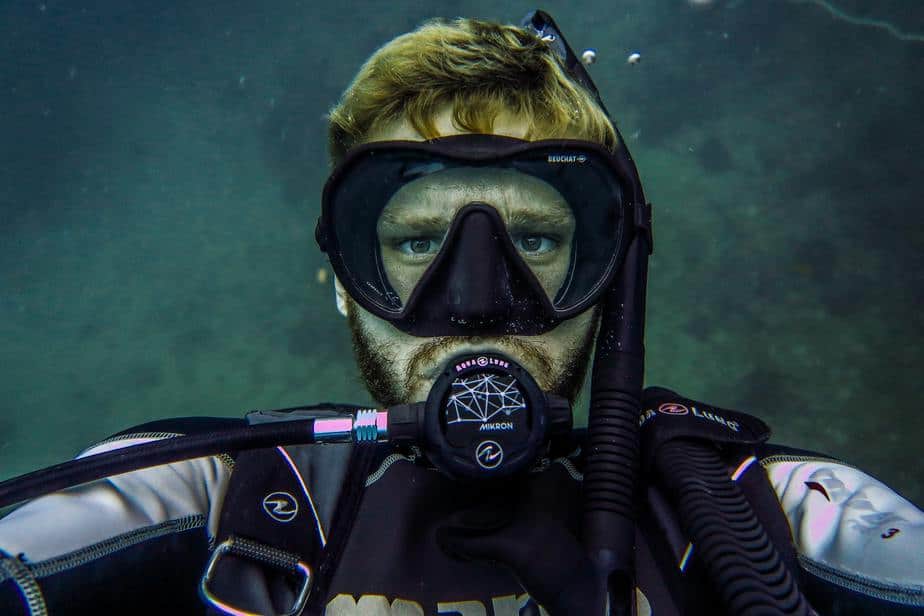You’ve spent a long time growing out and taking care of your beard and mustache, so you probably don’t want to hack it all off just so you can scuba dive on vacation. Whether it’s a 5 o’clock shadow, a goatee, or even a full on beard, facial hair is a natural part of a man’s appearance, and some men look like they belong back in high school again after shaving it off. No bueno. However, being able to scuba dive without water leaking in is also an attractive option. So how do we deal with this dilemma?
Is it possible to scuba dive without any mask leaks while keeping one’s beard and mustache? Unfortunately, there is no perfect way to solve this problem. You don’t have to do a full shave, but you probably have to shave at least a few millimetres off the top of your mustache, and possibly even a few millimetres from the sides of your beard close to your cheekbones depending on how large your mask skirt is. Also, exceptionally long beards might get in the way while you’re diving unless it’s tied up. You can try to use mask sealant to close the gaps that your facial hair creates, but this is not always reliable.
In this article, we’ll discuss how having a beard and mustache can affect your scuba diving experience. We go over why you might suffer a mask leak due to your facial hair, any steps you can take to avoid it, how to take care of your beard after exposing it to saltwater, and many more tips to make scuba diving with a beard and mustache more enjoyable.
What’s the issue with diving with a beard and mustache?
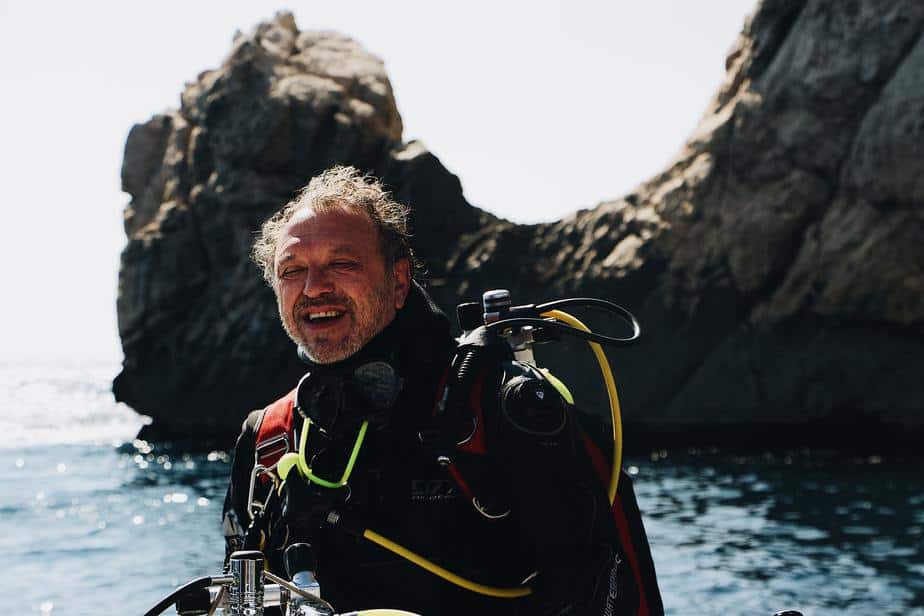
The primary issue scuba divers encounter when they grow out their beard and mustache is that water leaks happen more frequently.
Under normal circumstances, the silicone skirt of the mask would form a watertight and airtight seal against your skin. For best results, the skin should be smooth and flat.
Problems arise when you have facial hair, even just a little bit like a stubble. The prickly strands of hair are enough to form small gaps and allow the seal to weaken, resulting in water seeping in.
Now, this leak might only be minor, and maybe it’s something you can deal with if you regularly clear your mask anyways. However, depending on how long your dive lasts and how frequently you are forced to clear your mask, it can start to get really irritating.
In the worst case, you cannot even scuba dive properly because the gaps in the seal are so large that water enters like a flood.
There is also a minor issue of skin irritation. With the silicone skirt pressing so tightly on your hair, it can irritate your skin and maybe even rip off a few strands.
The reality of diving with facial hair
Risks
We’re going to keep this section brief because we’ve already written an entire article on what to do with long hair while diving. Here’s the summarized version.
Saltwater is not forgiving on hair. If you want your hair to be healthy, it needs to be hydrated. Salt extracts the water from hair, causing it to dry out. Your facial hair will feel like it’s brittle and made of straw after a dive.
Without taking proper care of your beard and mustache, the saltwater, along with the wind and sunlight will cause your facial hair to look frizzy and dried out, as if a bird made its nest in your beard. Rather than looking like a well-groomed gentleman, you will look more like a homeless bum.
There’s also the very practical issue of your beard possibly getting in your way if it isn’t tied down, depending on how long it is of course. Your beard can float up and literally obscure your vision, or make it harder to see your gauges and dive computer screen.
Even if you tie it up, depending on its length, it can still be a hazard if it gets stuck on something. A bundled up beard is basically like a rope that can wrap around or get caught by something. You better keep your dive knife handy in case you need to make an emergency cut.
How to care for your facial hair

Knowing how damaging saltwater is to your hair, what can you do to keep your beard healthy and vibrant? The biggest problem is your hair drying out, so you need to find ways to keep it hydrated. Here are a few methods:
- Coconut oil: Oil repels water, so you can apply some coconut oil to your beard before entering the water to keep the salt out of your beard. With that said, your mileage may vary, so we recommend doing a test run at the surface first.
- Hair conditioner: Hair conditioner works similarly as oil, but the advantage is that it won’t make your beard as heavy. When using conditioner, make sure to use a reef-safe one. Also, conditioner rinses off more easily than oil, so you have to reapply it after each dive.
- Fresh water: If you don’t have any product with you, the bare minimum you can do is to rinse your beard with freshwater until it’s saturated. This can prevent much of the salt from being absorbed.
Aftercare
Even if you’ve done any of the steps above prior to diving, to ensure your beard remains in healthy condition, you should perform these steps immediately after diving.
To start, you should moisturize your face and beard as quickly as possible because the steps above are not foolproof. Your facial hair will likely still be a little dried out.
Remember, you must rinse with freshwater. Some divers don’t prioritize hair care that much, so they may feel it’s a waste. However, if you’re using your own water, then they should have nothing to say. Plus, most dive boats have sufficient freshwater that you can use a little for your hair. If you’re shore diving, then just quickly hop into the nearest shower after doffing your gear.
How to keep your beard out of your way
Most bearded men keep their beards to a modest length. However, if you happen to have an extremely large beard that can get in the way of your diving, then there are a couple of things you can do.
The first option is to wear a dive hood . A dive hood will do a great job of securing your beard and it can fulfill its primary function of keeping your head warm. Divers lose as much as 60% of body heat from their head, so this option can help you dive for longer.
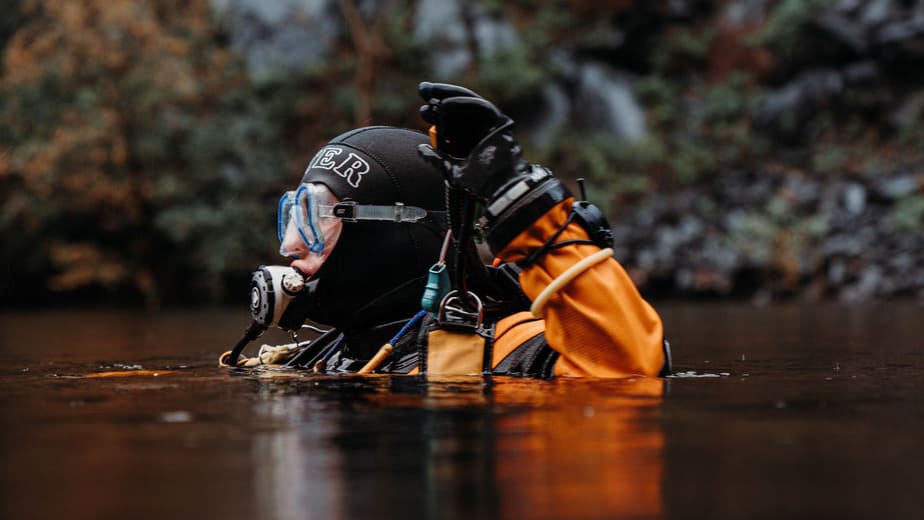
The second option is to use a generous amount of hair ties. Basically, bunch up your beard and tie the first hair tie as high up as you can, basically right underneath your chin. Then place the next hair tie an inch or two below the first, and the next one an inch or two below the second, and so on. Now, instead of individual strands of hair getting in your way, you have one big bundle that’s easier to manage. This still has the risk of getting stuck on something, so the dive hood is probably the better option.
Scuba diving compatible beards
The biggest issue is mask leakage caused by the mustache hair just below your nose. You don’t even need to completely shave off your mustache, just the little bit below your nose.
As you can see, this problem doesn’t affect all beards unless your beard has a mustache component to it. However, that means full beards, circle beards, and hipsters are not a great choice. A chin-goatee is just fine, as well as anything else that doesn’t require a mustache.
Depending on your natural hair growth and specific style, a second place where a mask leak might occur is around your cheek bones. Depending on the shape of your cheekbones, or how high up the beard grows, or how large the silicone skirt on your mask is, there may be some overlap between the skirt and your beard.
You’re going to have to test this out specifically because each individual has a different beard and facial style. It’s possible you need to shave a few millimetres off your mustache, or none, or all of it.
Long beards vs. short beards
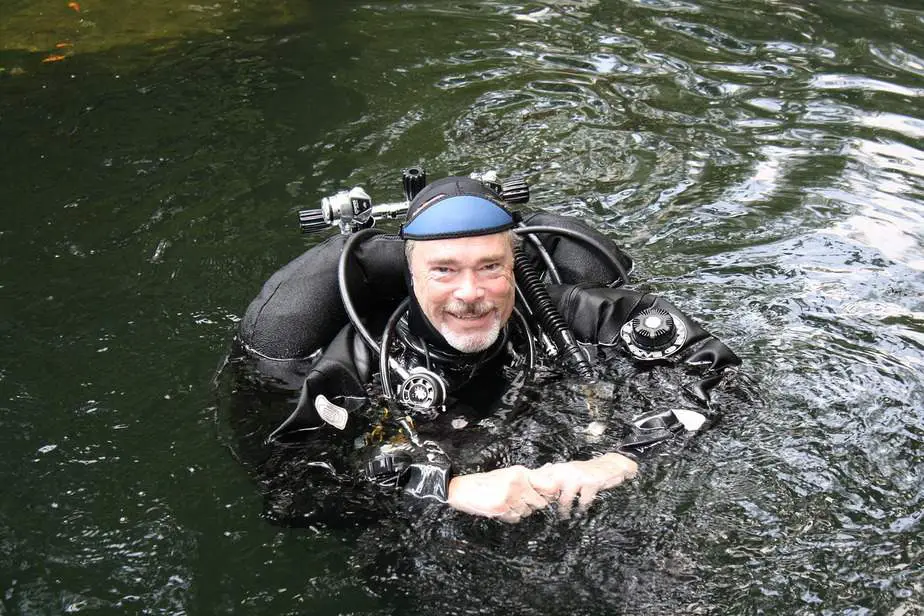
Yes, as we mentioned, a longer beard can get in the way of your scuba diving. Once subjected to the weightlessness of the underwater environment, your long strands of beard hair that would normally hang down beautifully on land can float up and cover your mask. You should cover it up with a dive hood or tie it up with hair ties.
There is also the issue of beard care. It’s already hard enough dealing with a dry, frizzy, and messy beard on land. Subjecting it to saltwater will exacerbate your problems and force you to use a lot of products, and even then, it’s no guarantee that your beard will look good after being assaulted by the saltwater.
Men with modest beards or stubble don’t have to stress as much over beard care because there’s less to deal with. The amount of product required to maintain their beard will be more manageable, and they don’t need to spend much time rubbing oil or conditioner into it. Obviously, longer hair requires more upkeep and whether it’s worth it depends on the individual.
Can stubble cause mask leaks?
Yes, it’s certainly possible even for a little stubble to cause mask leaks. Hair that’s only a day old or so is probably fine. The issue arises when the hair is a few days old and has grown long enough to create a gap between the mask skirt and the skin.
However, you can potentially still make it work with the help of some products. You can apply any of the following mask sealants on your mask skirt to potentially seal the gaps that the stubble is creating:
- Silicone grease.
- Burt’s Bees lip balm.
- Mustache sealer.
- Wax hair products.
Avoid using vaseline, because the petroleum contained inside may degrade the mask skirt.
Again, your mileage may vary. Each person has a different facial structure and hair density, so we cannot guarantee that any of the tips we provided here will work other than to simply shave all your facial hair off.
The next time you visit a dive resort and you see a dive master or scuba instructor with stubble or facial hair, ask them what products they use to protect their beard and keep water leaks from happening.
Should I shave immediately before diving?
Over the course of the day, our beard can grow enough to create a 5 o’clock shadow. You might be thinking that you should shave immediately before a dive so that the skin is as smooth as possible in order to prevent mask sealing issues. Yes, this is an option.
However, be aware that your freshly shaved face will likely be very sensitive. Perhaps sealing a mask skirt on your face will create a chafing sensation that feels irritating or uncomfortable.
Honestly, you don’t have to be too strict in terms of timing when you shave. Just do it the night before and it will probably be fine. Make sure to moisturize your face after shaving so it’s not dry and sensitive.
Are there scuba masks designed for beards?
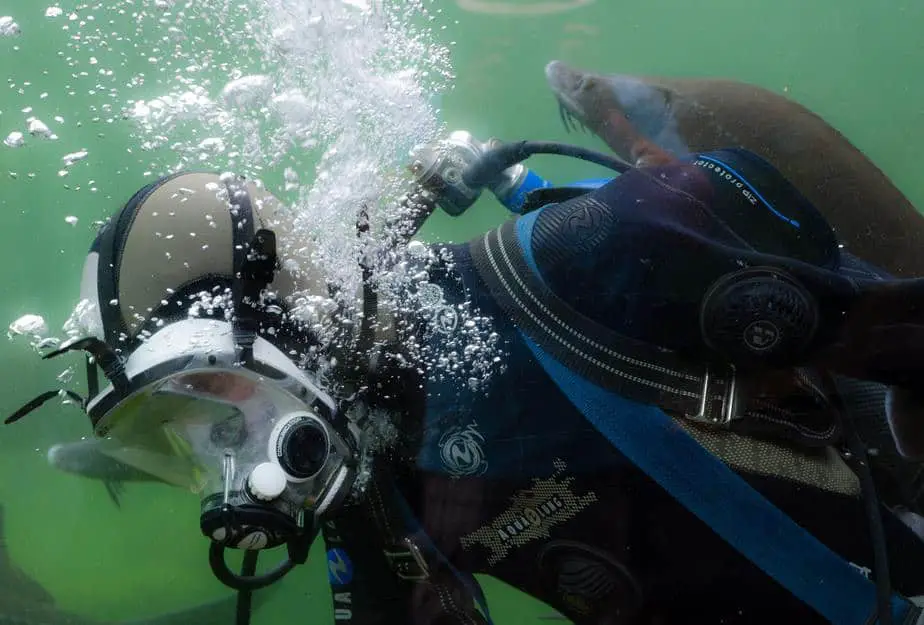
Full face scuba masks are not designed for beards per se, but they are potentially compatible with short beards because they seal around the edge of the face so they are not affected by a mustache.
With that said, long facial hair can still affect the mask’s seal unless it is tucked inside the way you would do with a dive hood. However, this can be a little impractical and perhaps uncomfortable.
For similar reasons, this is why first responders, like firefighters, who may need to wear a mask are required to shave their facial hair so they will never have mask sealing problems.
To add to the impracticality, full face masks are expensive and require additional training to use. So, unless you are a commercial diver or something, this is probably not an option for you and you’re better off following the other tips provided.
As for traditional scuba masks, perhaps you just need to try a few out until you find one that suits your facial structure. The masks recommended in this review are a good starting point in helping you find the best scuba mask that is also compatible with your face and beard.
Parting words
To sum it up, the biggest issue with facial hair when scuba diving is that they can get in the way of a mask’s seal, causing water to leak in.
There is also the issue of how damaging saltwater, wind, and the sun can be to your beard. You need to take measures to keep your beard hydrated through it all. Rub coconut oil into it. Rinse it with hair conditioner. Or at the very least, rinse it with freshwater until it’s saturated before a dive.
Depending on how long your beard is, you may need something to hold it in place. You can wear either a dive hood and tuck your beard underneath it, or use hair ties to bundle the individual strands together so that they don’t float up and obscure your vision.
After a dive, make sure to thoroughly rinse it with freshwater again. You can also reapply coconut oil or hair conditioner to make sure it stays moisturized.
If you have stubble, you can apply some mask sealant where the mask skirt touches the stubble to close the gaps that the stubble created. If all else fails, you can shave off the top of your mustache and keep the rest of your beard intact. The worst case scenario is that you have to do a full shave in order to scuba dive.

